South Africa

When I was eighteen years old I knew that I knew everything there was to know, especially in regards to the “us” and the “them” of the world. Eighteen-year-old me knew that being gay was a sin and that LGBTQ people were not called to leadership in the church (and my conservative Christian college did nothing but reinforce these beliefs). But four short years later I found myself on a hill across from my alma mater, standing in solidarity with dozens of LGBTQ young adults and allies, advocating for change in Christian universities with policies that discriminated against LGBTQ people.
How did I get from “there” to “here”? How did my view of “us” and “them” shift so radically?
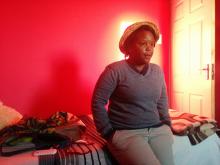
Sipping ginger beer at an outdoor restaurant in Gugulethu, one of South Africa’s murder hubs, Prince January said he feels safe.
Across the train tracks at their shared home in Manenberg, Hlubi George said she can finally sleep through the night.
January, who is gay, and George, who is lesbian, are both temporary residents at Inclusive and Affirming Ministries’ iThemba Lam LGBTI safe house on the outskirts of Cape Town. The two-bedroom center provides refuge and counseling for at-risk sexual minorities from across the continent and a safe space for residents to integrate “God’s gift of faith with God’s gift of sexuality.”
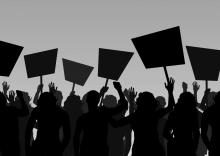
IT SEEMS AS though after liberation, the voice of conscience left the South African public sphere and retired to a quiet church life, so that the current generation barely knows that the church ever influenced South African political and public affairs.
On the day of Nelson Mandela’s inauguration, Archbishop Desmond Tutu famously announced that he was returning to do the “real” business of the church by leaving politics to qualified politicians. Years later, during the era of President Jacob Zuma, Tutu often lamented about the undesirable state of the country under the current leaders. He must have forgotten that by leaving politics to politicians in 1994, he too played a role in leading the nation to this position he now regrets.
Kairos South Africa recently celebrated its 30th anniversary. Church leaders from as far as Norway, the U.S., and Palestine all remembered how the 1985 Kairos document taught the worldwide church a hopeful language to address injustice. Yet now the majority of young people in South Africa do not know anything about this heroic church history.
South African anti-apartheid leader Allan Boesak referred to the Kairos movement as a “dangerous memory.” It does indeed have the potential to be a dangerous memory—one that should be remembered by every one of the Christians who make up 81 percent of the South African population. Unfortunately, it is a memory held by only a select older minority.
How can this change? This summer several members of the new generation of South African Christian leaders traveled to the U.S. to study how to be effective Christian agents of social justice. At the Wild Goose Festival in North Carolina, I listened to Bree Newsome explain that it was her faith in God that gave her the courage to pull down the Confederate flag at the South Carolina capitol after the massacre at Emanuel AME Church in Charleston. “You come against me with hatred and oppression and violence. I come against you in the name of God. This flag comes down today!” she said.

FOR NON-WHITES born in post-apartheid South Africa, the country promised equal rights and legal freedom. But the first generation of “born frees,” as they are called, also entered a world where HIV/AIDS was destroying their families and communities. Many children and teens were left largely fending for themselves in townships plagued by poverty, disease, and violence.
Author Kimberly Burge, a Sojourners contributing writer, entered this world not as an aid or social worker, but rather on a Fulbright scholarship, to form a writing group for adolescent girls in the township of Gugulethu. Too old for the child-centered programs and too young for adult assistance, the girls were falling through the cracks of established programs. The writing club offered them the opportunity to creatively express their fears, frustrations, and dreams.
To Burge’s credit, the book is not primarily about her or her experiences. She keeps the focus on the girls themselves and the often breathtaking words and thoughts they express in their writing. Burge is not there to rescue them, but rather to help them find their voices. She acts less as a teacher than a peer, encouraging girls to lead the group themselves and prompting them to write about such topics as “I wish I could ...” or “I need to find a place ...”
ONLY SOCIAL MOVEMENTS really change history. Developing, nurturing, and supporting a new generation of leaders is central to the long-term success of these movements. As leaders like me get older and look to the future, mentoring young leaders is particularly important. More and more of my time is spent doing that mentoring, not only broadly but in relationship to particularly promising young leaders whom I have met. It is some of the most important and enjoyable work that I do.
For many years, Sojourners called together large conferences on biblical justice and peace. Thousands of people came year after year, and many positive things happened—new relationships, connections, projects, and organizations—even marriages and families! Now, several other groups are having justice and peace conferences, which is exactly the kind of “competition” Sojourners has always hoped for.
Last year, some of our younger staff came up with a great idea—to have a leadership “Summit” for people already providing leadership for the biblical vision of justice and peace. All the participants would have to be nominated by credible leaders doing this work, and instead of Justice 101 with big speakers and standing ovations, this would become a new, creative environment for moving justice agendas forward—Justice 202. We didn’t publicly advertise these gatherings—instead, the invitation spread by word of mouth as leaders, especially younger ones, were drawn together by experienced justice leaders who nominated them.
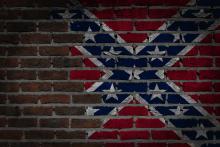
Flags are only symbols, of course. Chucking one for another does not automatically overhaul a society’s deeply entrenched structural oppression. Lowering a flag and relegating it, belatedly, to a museum does not change people’s hearts and minds. Under South Africa’s new flag, the Born Frees are inheriting a country awash in contradiction. How free can this generation be with one of the highest levels of income inequality in the world? With the rampant violence that especially plagues black townships and is frequently directed against women and girls? With the remnants of a broken school system that was not designed to educate all its citizens equally?
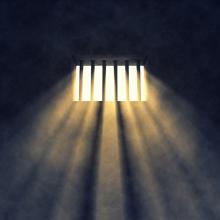
Week after week, we can take on the biggest issues we face as a society — from continuing racism, mass incarceration, inequality, and poverty to gender violence and human trafficking, climate change, ISIS — and just try to be hopeful.
Or we can start by going deeper, to a more foundational and spiritual understanding of hope — rooted in our identity as the children of God, made in the image of God, as the only thing that will see us through times like this.
I believe we should start there. Because the biggest problem we face — the biggest enemy at the heart of many of the issues we must address — is hopelessness.
And perhaps the most important thing the world needs from the faith community is today is hope.
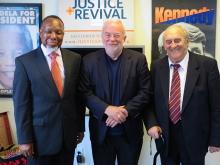
I was privileged to co-host with former colleagues the visit of former South African President Kgalema Motlanthe, an ex-convict from the apartheid era. He served 10 years in prison for the “treasonous” act of standing against the Afrikaans Nationalist regime, along with Nelson Mandela and 1000s of others who spent many years on Robben Island or in Pretoria Central Prison. Many died in the process. President Motlanthe was accompanied by Denis Goldberg, who was convicted along with Mandela and served 22 years. Nicholas Wolpe, the facilitator of the trip, is a cousin of the late Congressman Howard Wolpe. Nic’s father would have been one of the Rivonia accused at the trial in 1963-4 but for having made a daring famous escape with several other comrades.
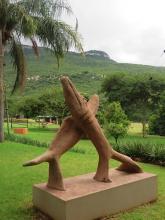
Not many people traveling in southern Africa consider Venda in the northern Limpopo Province a worthy touristic or project partnership visit. For years visitors to the South African Development Community have seen this more isolated, beautiful mountainous area of northern South Africa as a shortcut to Kruger National Park or to/from Pretoria and Johannesburg en route to the wonders of the 1,000-year-old Great Zimbabwe ruin or majestic Victoria Falls.
Perhaps a quick stop was worthy on the Musina-Beitbridge border to photograph the “great, green, greasy Limpopo River” made famous by Rudyard Kipling’s “How The Elephant Got His Trunk.” Not much else would interrupt the dash on the N1, similar to America’s own Route 1 from Canada to Florida.
Big mistake! As I found out when saying ill-advisedly to our travelling companions that “there really is nothing to see or stop for in the area … and we do have an important dinner appointment in Pretoria.” The twofold result was a serious late night ”domestic” with my more adventurous and intuitive wife, Karen, and secondly, a necessary, more open-minded review of the unexplored albeit minimalist pages on the Venda Region section of the Rough Guide and Lonely Planet guidebooks. Alas the travel guides seemed to have the same misperception as my 30-year-old wisdom.
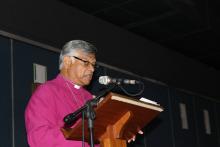
“Come to the living God … Come to stand alongside those who suffer
Come to those who seek freedom … Come to resist all that offends God’s justice
Come to Jesus as He hangs on the Cross … Come to the living disturbing God.”
DURBAN, South Africa — A precursor to Easter sunrise and call to commitment is the now 30-year ritual Good Friday packing of the International Exhibition Center with 3,000+ ecumenical congregants participating (with dance, choir, prayers, and prophetic preaching) in the call to “Arise – Act for a Just Society.” Anglican Bishop Rubin Phillip set the scene with a moving historical reminder of the reason for the 1985 first march to the central prison. It was to protest the silencing of the 16 Durban “treason trialists” (including congregational deacon Archie Gumede, and Frank Chikane, post-apartheid member of the first multiracial Assembly, Apostolic pastor, and future President Nelson Mandela staff chief). Family members of the incarcerated and current elected leaders carried a cross to city hall, calling all to love mercy and act justly. We paused to give thanks for their courage at the one remaining wall of the prison now in the front plaza of the iconic convention center. When the first march 30 years ago stopped to sing and pray, “voices were heard from inside the prison joining in the singing of Good Friday hymns.”
IN JUNE 1966, Sen. Robert Kennedy joined the National Union of South African Students for a conference held in Cape Town. Tension was running high. NUSAS president Ian Robertson had been banned under the Suppression of Communism Act, and the pressure was on Kennedy, from both the apartheid government and sectors of the anti-apartheid movement, not to attend.
Kennedy went anyway and delivered one of the best speeches of his career. “Few have the greatness to bend history itself,” Kennedy reminded the students. “But each time a [person] stands up for an ideal, or acts to improve the lot of others, or strikes out against injustice, [s/he] sends forth a tiny ripple of hope ... daring those ripples to build a current which can sweep down the mightiest walls of oppression and resistance.”
Twenty-eight years later Nelson Mandela became the first democratically elected president of South Africa. The West embraced him, celebrating his magnanimity, “disremembering” the support it gave to the very apartheid regime Mandela worked to dismantle.
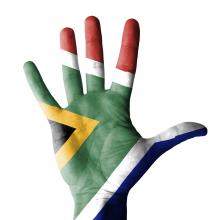
SOUTH AFRICA has meant a lot to Sojourners over the years. In the 1980s, I was invited to come to South Africa by key church leaders there, including Beyers Naudé, the first white minister defrocked by the Dutch Reformed Church for opposing apartheid; Desmond Tutu, the Anglican archbishop of Cape Town; theologian and preacher Alan Boesak; and Frank Chikane, a Pentecostal minister who came up through the ranks of the movement to lead the South African Council of Churches.
They became my “comrades,” as they say in South Africa, for six weeks that happened to fall during Lent—it was a powerful season for me of seeing and feeling the pain of that beloved country while looking for the hope that comes from people who make costly commitments. Together we worked on a strategy between South African and U.S. church leaders to end apartheid.
Ten years later I returned to witness the victory of that hope in the miracle of Nelson Mandela’s inauguration as South Africa’s first black president, and later came back for an international reunion of anti-apartheid activists. Those formative years in the South African movement for freedom helped give me my theology of hope—which I learned means believing in spite of the evidence and watching the evidence change.


I was in South Africa on August 9, when a young, unarmed black man was killed by a white police officer in Ferguson, MO. It didn’t take long before Michael Brown’s story was on all the news channels in South Africa. After that, in every media interview I did Ferguson came up. “How could this have happened?” all the journalists asked. When I laid out the pattern of this happening regularly to men of color in America at the hands of white police or other men with guns, they were stunned. “White cops couldn’t get away with that anymore in South Africa,” they said.

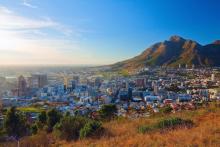
In a township called Khayelitsha, a woman wakes well before dawn to catch a bus that will carry her to the beautiful home in Cape Town where her employer/boss/master wants his tea in bed by 7 a.m. That is what “post-apartheid” South Africa still looks like today.
I just returned from a remarkable month in South Africa—the country that changed my life. I’ve often said that I learned my theology of hope from South Africa, during the anti-apartheid struggle I was thrust into as a young man. South African church leaders invited me in years ago. I got to see and experience the costly movement for freedom in the 1980s, witness the miracle of the inauguration of Nelson Mandela’s rainbow nation in 1994, and later join a wonderful reunion of South African activists, many of whom had been in exile or in prison, along with some of us international allies. So when I set out on a South African speaking and book tour 20 years after the new democracy, I didn’t know what to expect.
This time, I brought my family so they could see the country that had meant so much to me. What I discovered was a new generation of South African leaders ready to define their own vocation and mission as they help build a new nation. I quickly came to understand that making a deep connection with them was the real reason that I had come back. It’s tough to be in the shadow of a heroic generation of leaders like Desmond Tutu whose agenda has been the political liberation of South Africa—accomplished to the amazement of the world. On this trip, 20 years later, I saw the incredible freedom of movement now for all the former racial categories—but also how the systemic geography of apartheid was still painfully evident.
Economic inequality in South Africa is now greater than it was even during the days of apartheid, and gender violence is rampant. So these are the new agendas of a new generation: economic liberation and gender equality, with a commitment to lead on both in the churches. The rainbow of young people who turned up in such great numbers at all of our events truly want a new South Africa— a society yet to emerge.
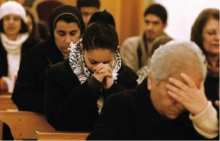
Oppressive poverty, like corruption and unfettered crime, is a human condition to be addressed and mitigated by principled choices to alter societal structures. This is particularly illustrated in South Africa with the ongoing historic challenge of the lingering old apartheid effects of legalized separation of races and tribal groups. Attitudes and demographics are still entrenched. The marginalized suffer most. Escalating crime is still in large measure black on black, but all sectors of society live with corruption and hear in the media the drumbeat of violence — and not only when there is a high profile feeding frenzy trial such as for Oscar Pistorius.
In a meeting with Kairos Southern Africa leaders, a senior ANC party executive acknowledged, “We have failed in service delivery and turned a blind eye to corruption … please help us make the changes necessary.” To be true to the liberation pledges, Kairos members are mobilizing civil society to act accordingly, along with an informed electorate and principled politicians, to address the residue of years of oppression both here and abroad.
A public way in which religious leaders from across the theological spectrum participated in this regard was in a solidarity conference called by the South Africa Parliament “portfolio committee” on International Relations and Cooperation. Consensus for action was not automatic on the apartheid-like oppression in Israel and Palestine. But respect for those of differing theological and political understandings was for the most part encouraging and enlightening.
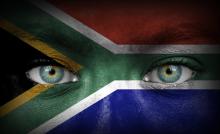
In the Khayelitsha township near Cape Town, Baphumelele Respite Care Centre and Clinic serves abandoned children as well as ill adults. The staff faces daily the anguish of caring for babies and older children with serious congenital alcohol and drug syndrome or HIV/AIDS complications. A compassionate professional team and scores of volunteers provide education and rehabilitative residential care for countless patients and support to child headed homes.
A nurse friend on the staff gave witness to the disparity between day-to-day realities when faced with the inadequate response by government and societal leaders. It is stunningly the case in South Africa in the post-Mandela era. The clinic was started in 1989 by the local founding-director Rosealia Mashale, “Rosie,” who could not abandon vulnerable children to the trash heap.
Even with more than 25 similar agencies active in the sprawling location of mostly substandard housing and services there are thousands still in need.
Professor Jonathan Jansen, a trusted commentator in South Africa and author of We Need to Act, reminds citizens to leave their comfort zones and contribute to righting the wrongs of society
These magazine articles and blog posts published by Sojourners through the years pay tribute to the great South African leader.
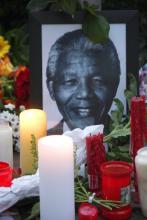
NELSON MANDELA was the most important political leader of the 20th century. While Roosevelt and Churchill helped protect the West and the world from Hitler’s Nazism, Mandela heroically exemplified the movement against the colonialism and racism that oppressed the global South, shown so dramatically in South Africa’s apartheid. And from a Christian point of view, he combined justice and reconciliation like no other political leader of his time, shaped by the spiritual formation of 27 years in prison.
Shortly after Mandela was released from prison, he came to New York to meet with a small group of Americans who had been involved in the anti-apartheid struggle, and I was blessed to join them. From the start, I felt in Mandela a moral authority I have never experienced with any political leader.
Attending Mandela’s inauguration in 1994 was a highlight of my life. We were picked up at the airport by friends, a couple who had both been in prison and tortured, but now she was about to become a member of the new South African parliament. We saw a group of the infamous South African security police. Having been interrogated by these thugs before, I immediately said, “Let’s get out of here!” To which they replied, “Don’t worry, Jim, they’re ours now.”
At the ceremony, joined by my South African friends, we watched Nelson Mandela announce his vision for a new rainbow nation. More than 100,000 people (and a billion or so more via TV) listened with tears in their eyes and great hope in their hearts.